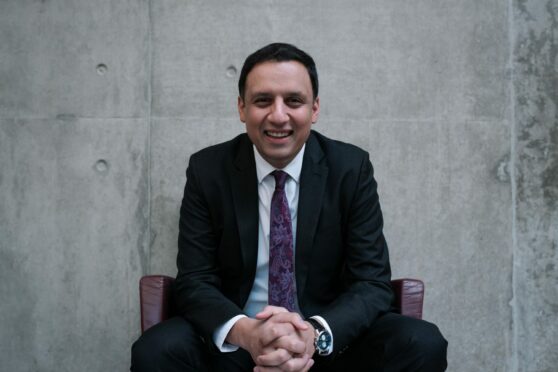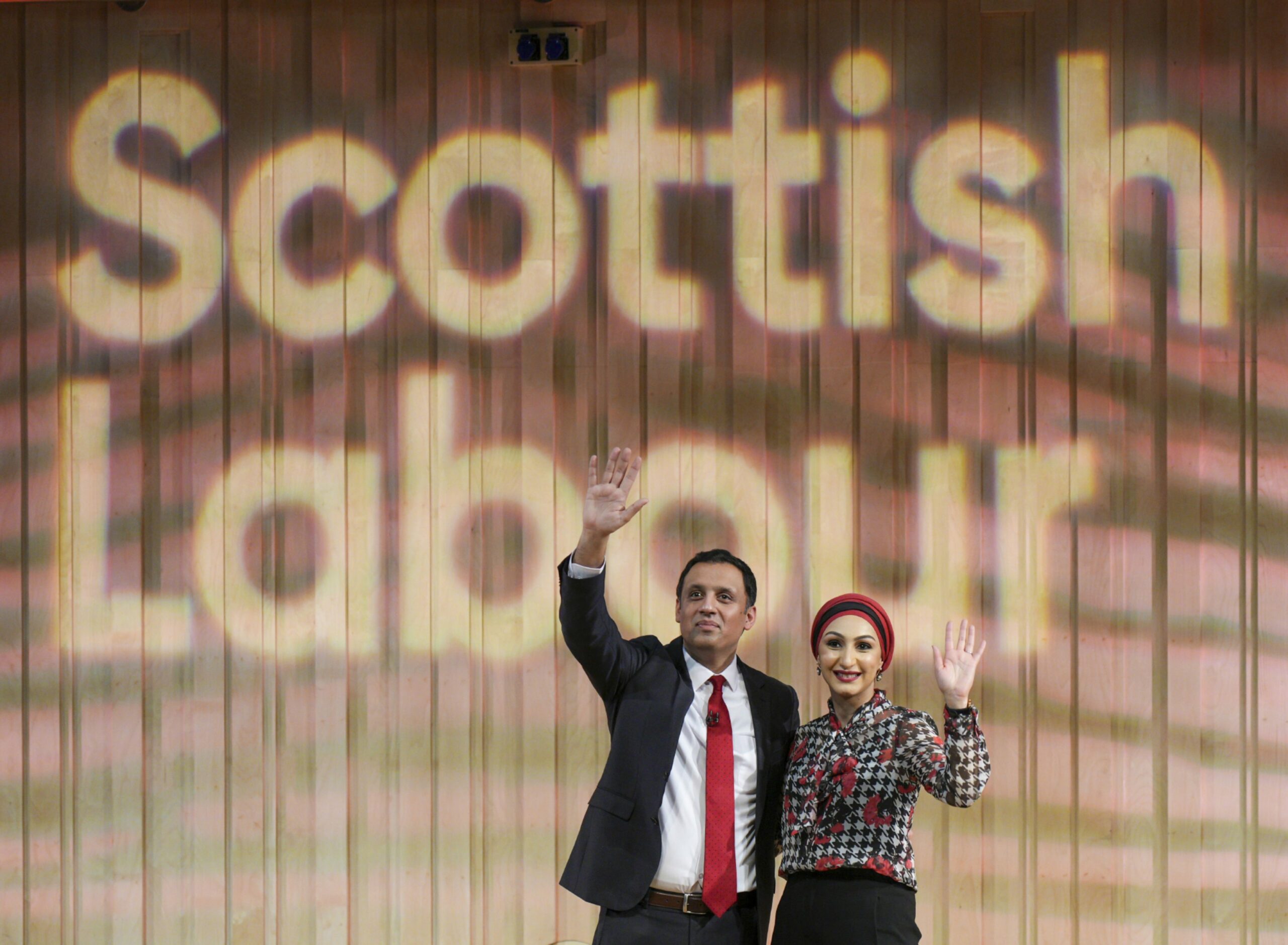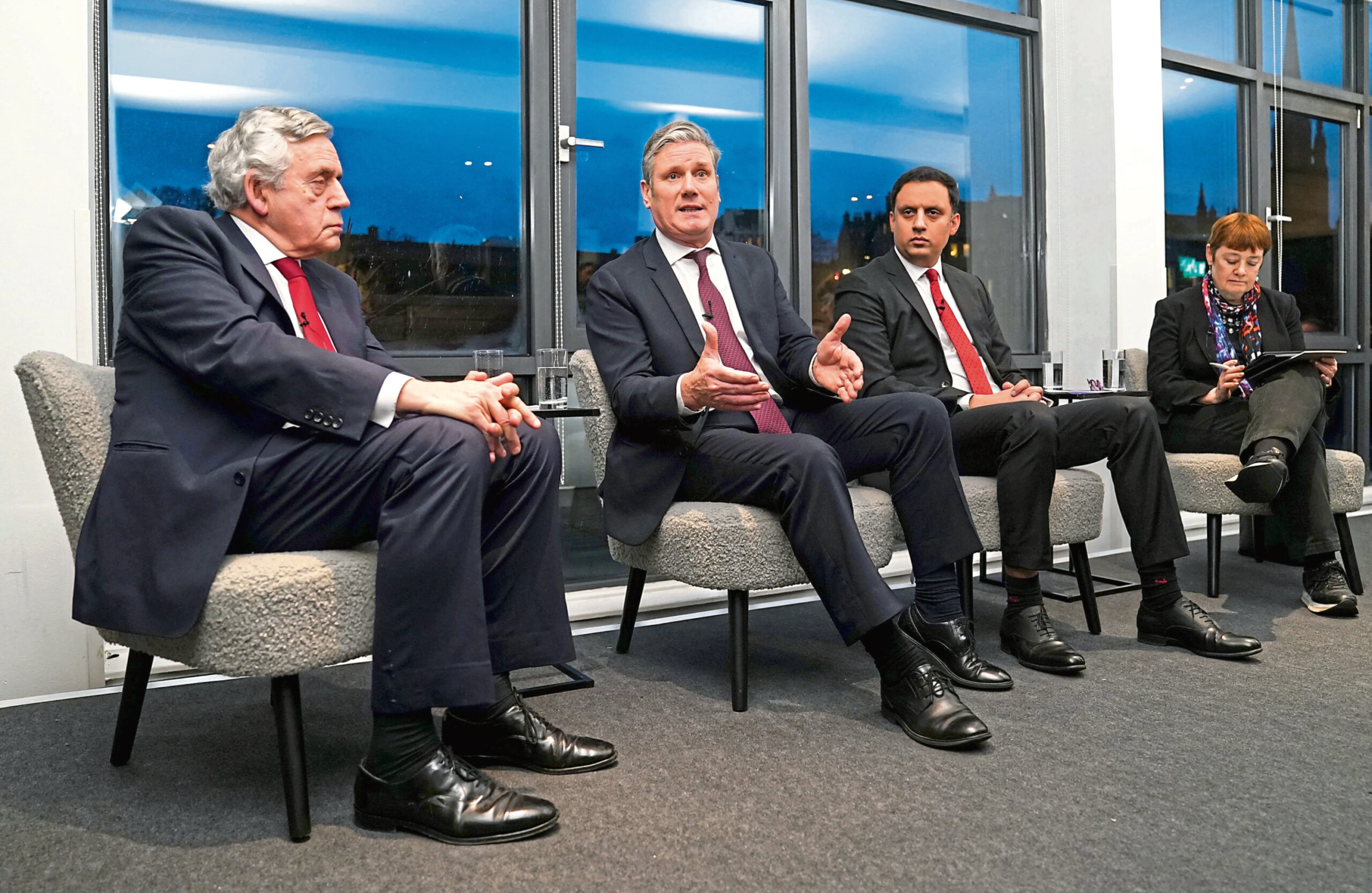
It is one of the most spectacular views in Scotland but the monumental vista of Edinburgh Castle did not distract Anas Sarwar for a moment.
In the glass-fronted conference room in the Apex Hotel, the Scottish Labour leader only had eyes for the prize as, joining Gordon Brown and Keir Starmer, he helped unveil the former prime minister’s 155-page blueprint for a new Britain.
An hour after Monday’s press conference five floors above the Grassmarket, as Starmer and his aides were still negotiating the traffic out to the airport, Sarwar finally finished with broadcast interviews and, loosening his tie, sat down to explain the significance of Brown’s 40 recommendations, including some of the most potentially seismic constitutional reforms in the country’s history.
Labour is riding high in UK polls with most commentators expecting Starmer to be the next prime minister and, in Scotland, his counterpart is also making headway as Scottish Labour move decisively ahead of the Tories and edge upwards towards the still-dominant SNP.
In February 2021, Sarwar, 39, took charge of a party which had once, not so long before, been similarly dominant in Scotland before losing support, from the left and right, as Scotland’s constitution polarised debate into a Yes and No question. He took charge just 10 weeks before a Holyrood election when polls showed support for Labour at 14% just before the election. The party is now polling at 25%.
Like Starmer, Sarwar is not a politician to make rash promises or overstate progress but has no hesitation in saying that, after a hard struggle to be heard by voters never mind convince them, Scottish Labour is back in the game.
He said: “I’ve always viewed this job as having multiple phases. Phase one in 2021 was stop Armageddon – we were predicted to be fourth in the Holyrood election – and ensure survival of the Scottish Labour Party. We did that.
“The second phase was to change the Scottish Labour Party internally in terms of making it a functioning organisation again worthy of the name, as well as increasing its credibility externally. We did that too. The third was getting the Labour Party back on the pitch and back into second place rather than being a distant third. We did that at the council elections this year.
“Now, the next phase is to win seats and make gains so we can play our part to delivering a Labour government across the UK.”
Another poll last week was less encouraging for Labour and the other unionist parties, however, suggesting a majority of Scots would now vote Yes but Sarwar believes Brown’s constitutional plan, promising increased political and economic devolution, will help convince voters who want change and may be contemplating independence that the United Kingdom can work an awful lot better.
Recommendations include more borrowing powers for Holyrood, the creation of a new Council of the UK to promote joint working between governments across the nation, moving 50,000 civil service jobs out of London and replacing the House of Lords.
Needless to say, the Tories and the SNP rubbished the proposals for going too far or not far enough but polling in the report suggests the majority of voters, including 69% north of the border, want better co-operation between the devolved governments of Wales and Scotland and the UK Government and Sarwar urged his opponents to back the proposals to give more powers to Scotland.
Sarwar said the other parties’ response was regrettable but predictable, adding: “It suits both the SNP and Tories to play on conflict between both governments for their own political ends. This report makes clear the vast majority of people, whether they support independence or oppose it, want co-operation between our governments. So we’re talking about co-operation around tax and borrowing, economic potential, the green revolution and creating tens of thousands of jobs here in Scotland.
“This is a very different approach, and that’s why we want to create a Council of the UK chaired by the prime minister and attended by all the devolved government first ministers.”
However, Sarwar, who was named Scottish Politician of the Year and Donald Dewar Debater of the Year at The Herald awards recently, said despite their differences most politicians of all parties in Scotland wanted the best for their country.
He said: “I don’t view politicians from other political parties as enemies. Yes, we are political opponents but I think the vast majority of politicians, certainly the vast majority of politicians in Scotland, ultimately have many things in common that we often don’t want to admit to because we think we have to be pitted against each other as enemies.
“We all do a job that is not normal. We all do a job that impacts on our family life. We all do a job that impacts at different moments on our mental health. We are all, or at least the vast majority of us, in it for the right reasons.
“That’s why I don’t ever use inflammatory personal language about any politician. But let’s be very clear here. Where I differ from Nicola Sturgeon is that she is a conflict politician. I am a co-operation politician. She believes in putting people in Scotland into individual tribes and us versus them. I believe in all of us.
“She believes in feeding off people’s anger to try to divide our communities. I believe in unity so we can pull our communities together and demonstrate change is possible. And she believes in the politics of despair in order to get what she wants. I believe in giving people hope that a better future is possible. That means a stronger Scotland in a changing, reforming, modernising UK.”
According to the Ipsos poll on Wednesday, 56% of Scottish voters would vote Yes in an immediate referendum while 44% would vote No. The poll came a fortnight after the Supreme Court ruling that Sturgeon cannot hold another independence referendum without permission from Westminster.
The first minister is still insisting the next general election will be fought as a “de facto referendum” on independence and last week’s poll suggests independence-supporting parties would win more than 50% of the vote.
Sarwar believes the notion of a single-issue election is far-fetched with Starmer already ruling out secession negotiations with the SNP if Labour win the next election.
He said: “I recognise that there are people who have strongly held views around the constitution. While I disagree with independence and don’t support a referendum, I understand why people want to run a million miles from this out-of-touch, corrupt Tory government.
“But I believe there is a way of doing that, that reflects that anger is not unique to Scotland but is right across the UK, and how by pulling ourselves together, by delivering change, which ultimately is a Labour government, we can achieve a reality that people want, which is democratic, social and economic renewal.”
One of Brown’s most significant proposals is abolition of the House of Lords and its replacement with an elected assembly of regions and nations that would be three-quarters smaller. The plan to scrap the Lords comes in the wake of Boris Johnson’s resignation honours list reportedly including multi-millionaire Tory donors, Conservative MPs and former personal aides and advisers. Johnson’s successor as prime minister, Liz Truss, could also nominate resignation honours despite only lasting 44 days in Downing Street.
Meanwhile, Tory peer Michelle Mone, who was put into the Lords by David Cameron, is under investigation and has lost the Tory whip after claims she used her position to lobby for a firm linked to her husband to win government contracts during the pandemic before the couple and their colleagues allegedly took £100 million in profits from the £203m deals.
Sarwar said: “Boris Johnson and Liz Truss are the embodiment of everything that is wrong with this Conservative Party and why we want to get rid of this rotten Tory government.
“They view seats in the House of Lords as gifts to be given out as sweeties as rewards for corruption and loyalty in the most difficult and wrong circumstances, rather than positions of honour and integrity.
“Boris Johnson’s resignation honours list is a list for cronies and friends, rather than a list that’s about trying to change our country. A resignation honours list from Liz Truss would be an embarrassment, unless she’s planning on honouring the lettuce.”
After reports suggesting senior aides were unconvinced about committing to the abolition of the Lords in Labour’s first term, Starmer said it would be a priority if he becomes PM. The SNP says the party has been making the same promise for 100 years but Sarwar insists Starmer is serious about scrapping Westminster’s swollen, unelected upper house.
He said: “They misjudge the character, integrity, values, principles and determination of Keir. Do not take his rational tone as being some kind of weakness when it comes to a determination to change our country.
“This is a man who has been ruthlessly focused on changing the Labour Party in order for us to have the ability to change the country.
“He’s determined to be prime minister so he can change our country for the better, and when we get to the election campaign the manifesto won’t be an encyclopedia of promises that are never going to be kept but a tight document that will be seen as a delivery agenda that transforms our country.”
Sarwar said that he has had “lots of conversations” with Labour peers about abolishing the Lords, and that “a number of them” had agreed it was an arcane, outdated institution, adding: “It’s important to recognise many Labour peers have done extraordinary things through the House of Lords.
“Let’s not forget, for example, Lord Dubs’s amendment giving safe passage to unaccompanied refugee children in Europe. Let’s not forget that at the height of the Brexit fiasco, it was Labour peers who were trying to put some sense back into the Brexit agreement.
“There have been many positives that Labour peers have delivered but as an institution, it’s past its sell-by date.”
Like most modern-day politicians, Sarwar is busy on social media but the father of three vowed to stay off it on Christmas Day at least.
He said: “I think it’s important, not just for politicians, but for people across the board to take a break. Christmas for me is a time for family. It’s about spending time with the kids, eating lots of food and catching up on television. The political bun fights can wait.”

Enjoy the convenience of having The Sunday Post delivered as a digital ePaper straight to your smartphone, tablet or computer.
Subscribe for only £5.49 a month and enjoy all the benefits of the printed paper as a digital replica.
Subscribe © Stuart Wallace/Shutterstock
© Stuart Wallace/Shutterstock © PA
© PA